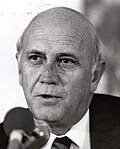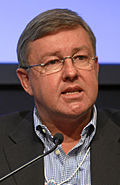| Leader of the Opposition of the Republic of South Africa | |
|---|---|
10 other official names
| |
| Style | The Honourable |
| Term length | While leader of the largest political party in the National Assembly that is not in government |
| Inaugural holder | Leander Starr Jameson |
| Formation | 15 September 1910 |
| Part of a series on the |
| Politics of South Africa |
|---|
 |
The leader of the opposition in South Africa is the leader of the largest political party in the National Assembly that is not in government. The House of Assembly was the most important House from 1910 to 1994 and the National Assembly from 1994. The leader of the opposition acts as the public face of the opposition, leading the Official Opposition Shadow Cabinet and the challenge to the government on the floor of Parliament. They thus act as a chief critic of the government and ultimately attempt to portray the opposition as a feasible alternate government.
Contents
- Legal definition
- List of leaders of the opposition in South Africa (1910–present)
- Timeline
- References
The position of opposition leader in the National Assembly is currently held by John Hlophe of the uMkhonto weSizwe (MK), who was appointed on 25 June 2024. [1]
In the list below, when the office is said to be vacant, there was no opposition party with more than ten seats and no clear leader of the opposition has been identified. This was the case between the formation of the Hertzog–Smuts coalition in 1933 and the breakaway of the Purified National Party (GNP) in 1934. It was also the case during the Government of National Unity between 1994 and 1996, when the National Party (NP) withdrew. [2]
In the case of the Democratic Alliance (DA), the leader of the opposition may have been the Parliamentary leader only, during a vacancy in the party leadership and the first part of their own tenure, before being confirmed as party leader by a party congress. Athol Trollip and Lindiwe Mazibuko (and Mmusi Maimane for a short period) have been Parliamentary leaders only, whilst the incumbent Federal Leader of the Democratic Alliance, Helen Zille, was not a member of Parliament.
Following the national election in May 2024, the African National Congress (ANC) lost its outright majority for the first time in South Africa’s democratic history. The DA entered the government, the ANC-led Government of National Unity, for the first time. The new MK party, the third biggest political party in the parliament after the ANC and the DA, became the official opposition. [3]























